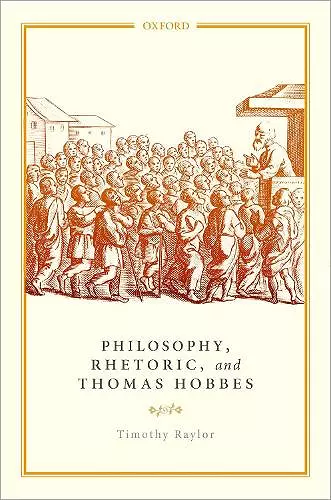Philosophy, Rhetoric, and Thomas Hobbes
Format:Hardback
Publisher:Oxford University Press
Published:20th Nov '18
Currently unavailable, and unfortunately no date known when it will be back

Thomas Hobbes claimed to have founded the discipline of civil philosophy (political science). The claim did not go uncontested and in recent years the relationship of philosophical reasoning to rhetorical persuasion in Hobbes's work has become a significant area of discussion, as scholars attempt to align his disparaging remarks about rhetoric with his dazzling practice of it in works like Leviathan. The dominant view is that, having rejected an early commitment to humanism and with it rhetoric when he adopted the 'scientific' approach to philosophy in the late 1630s, Hobbes later came to re-embrace it as an essential aid to or part of philosophy. Philosophy, Rhetoric, and Thomas Hobbes proposes that Hobbes was, from first to last, dubious about the place of rhetoric in civil society, and came to see it as a pernicious presence within philosophy - a position from which he did not retreat. It offers a fresh and expanded picture of Hobbes's humanism by examining his years as a country house tutor; his teaching and his translation of Thucydides, the influence on him of Bacon, and the range of his early natural historical and philosophical interests. In demonstrating the distinctively Aristotelian character of his understanding of rhetoric, the book also revisits the new approach to philosophy Hobbes adopted at the end of the 1630s, clarifying the nature and scope of his concern about the contamination of philosophy and political life by the procedures of rhetorical argumentation.
...is a work that is well worth the reading. * Todd Butler, Washington State University, Milton Quarterly *
The arguments of this monograph are put in a manner at once exacting and enjoyable * Christopher Tilmouth, The Seventeenth Century *
addresses the long-standing issue in Hobbes studies of the relationship between rhetoric and philosophy. Raylor's definitive answer, based on meticulous and original research on Hobbes's earliest writings, is that Hobbes did not abandon a commitment to an earlier humanist understanding of rhetoric in his new philosophy ... Recommended. * E. J. Eisenach, CHOICE *
an important and scrupulous account of Hobbes's attitudes to rhetoric. * Times Literary Supplement *
Raylor's book does an outstanding job of redefining the paradigms within which Hobbes developed his oeuvre. Paradoxically, one stimulating effect of that is to prompt one to wonder anew just what features of this most self-conscious writer's thinking nevertheless continued to go unsaid, escaping the Apostle of Malmesbury's aspiration to render philosophy as such, and his own philosophy in particular, perspicuous to himself and his readers alike. * Christopher Tilmouth, The Seventeenth Century *
Philosophy, Rhetoric, and Thomas Hobbes substantially deepens our knowledge of Hobbes's lifelong engagement with rhetoric. Its fine scholarship enriches the ground over which scholars will continue to disagree. * Torrey Shanks, Rhetorica *
Timothy Raylor's Philosophy, Rhetoric, and Thomas Hobbes is a fascinating book. Based on in-depth knowledge of both published and unpublished sources and careful analyses of writings Hobbes composed or translated, or with which he was otherwise associated in the years before 1640, the book is full of interesting insights and arguments... scholars of Hobbes have much to learn from this book... Raylor's book is a valuable contribution to the literature on Hobbes. * David Johnston, Department of Political Science, Columbia University, New York, Hobbes Studies *
Raylor's book contains excellent discussions of several understudied texts by Hobbes such as the Thucydides translation, Hobbes's Digest and Briefe of Aristotle's Rhetoric, and the Latin poem on the Peak District, in addition to analyses of the well-known political works...In each chapter of this superb study Raylor has new things to say, and though several elements of his reconstruction will be familiar to the Hobbes scholar, the overall picture he draws, based on a vast reading also of the secondary literature, is a comprehensive, important, and impressive contribution to Hobbes scholarship. * Lodi Nauta, Rijksuniversiteit Groningen, Renaissance Quarterly *
lucidly expressed, and impressively researched ... a fascinating and important book, which contains much material on Hobbes and his associates and on their ideas about rhetoric and philosophy, and which is certain to stimulate further debate. * Johann Sommerville, Journal of British Studies *
Timothy Raylor's book constitutes a major advance in understanding Thomas Hobbes's thought in several dimensions: of course, in philosophy and rhetoric, as his title indicates, but also in Hobbes's views of history, science, and civic humanism. Raylor's scholarship is of the highest order; and his judgment about texts, Hobbes's and others', is acute. His book should be as important to historians of philosophy as to rhetoricians and intellectual historians. . . . Raylor's knowledge is continentally broad and oceanically deep. * A. P Martinich, Journal of the History of Philosophy *
ISBN: 9780198829690
Dimensions: 241mm x 164mm x 27mm
Weight: 688g
354 pages